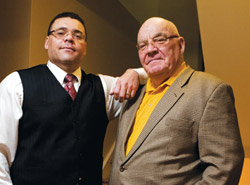The Son Also Rises: After Blago, Sam Adam Jr. Is Ready for a New Role

Photo of Samuel Eugene Adam, Jr.,
with father Samuel Forbes Adam, Sr.,
by Wayne Slezak
OK, call him an actor—or even a used car salesman—Sam Adam Jr. doesn’t care. He did, after all, minor in acting at the University of Wisconsin–Madison. At one point he could see his life going in that direction. But now he’s a defense lawyer, and a very good one. And all he cares about is what a jury thinks.
“What a used car salesman has to do is talk in such a way and bring points in that someone doesn’t see with a used car. You get them to see what you see, and the position you’re selling to them,” he says.
Most lawyers are afraid of looking crass. They think jurors won’t buy it, and their egos won’t let them go there. But Samuel Eugene Adam—his friends call him Sasha—thinks that’s his job: acting.
“To me, it’s theater. If you believe it, you get instant credibility with the jury.”
And it’s working for him. In recent years the Chicago attorney, teaming up with his father—longtime criminal defense lawyer Samuel Forbes Adam—has turned heads inside and outside Chicago with his representation of some of the city’s most illustrious criminal defendants.
Three years ago, R&B balladeer R. Kelly was facing prison on charges of having sex with a minor—counts based on a widely available video. Sam Adam Jr. walked him. Last year, the father-son duo represented Rod Blagojevich, the former Illinois governor, in his high-profile fraud and corruption trial. Blagojevich was accused, among other things, of trying to auction off President Barack Obama’s former U.S. Senate seat. Of 24 charges against him, federal prosecutors were able to nail down only a single charge: lying to the FBI. The jury was unable to reach a verdict on the other 23 charges.
And though the Adams aren’t representing Blagojevich in his retrial—the ubiquitous former governor has run out of money—Adam Jr. is still bothered by Blagojevich’s single conviction and thinks it’s his fault. Father and son believe that the prosecution underestimated them, mistaking their old-school bombast for a lack of acumen.
“Maybe the Adams want to say they were taken less seriously by the government, but maybe they want to rewrite history,” says a former Chicago federal prosecutor, now in private practice, who asked not to be quoted by name. “It doesn’t matter who’s on the other side; you can’t try a former governor without taking a case seriously.”
“They got a fairly amazing result,” says D. Peter Wise, a past president of the Illinois Association of Criminal Defense Lawyers and a name partner with Gates, Wise & Schlosser in Springfield, Ill. “For the prosecutors who tried this case, it might be fair to say they have a little egg on their faces. The statewide expectations were that this case was a slam dunk for the government.”
The U.S. attorney’s office for the Northern District of Illinois told the ABA Journal it had no comment.
That doesn’t mean that many in the Chicago bar don’t question the theatrical style favored by the Adams, both younger and elder, saying it isn’t appropriate for federal court.
Sasha has heard the critics, and he is unmoved. He rehearses opening and closing statements in his office, which is the living room of a three-flat he purchased near the University of Chicago. But when he performs in the courtroom, it is without a script—no cards or outlines for opening and closing statements—just a freewheeling one-man show.
“If I pay $200 to see Tony Randall in a play, and I go to the theater and he’s reading the script, I’m going to say, ‘What kind of play is this?’ A jury trial is nothing but theater. I can miss a point or two, but that’s OK. It’s just the experience.” OK, so he missed the point that Randall died in 2004.
Click here to read the rest of “The Son Also Rises” from the June issue of the ABA Journal.



